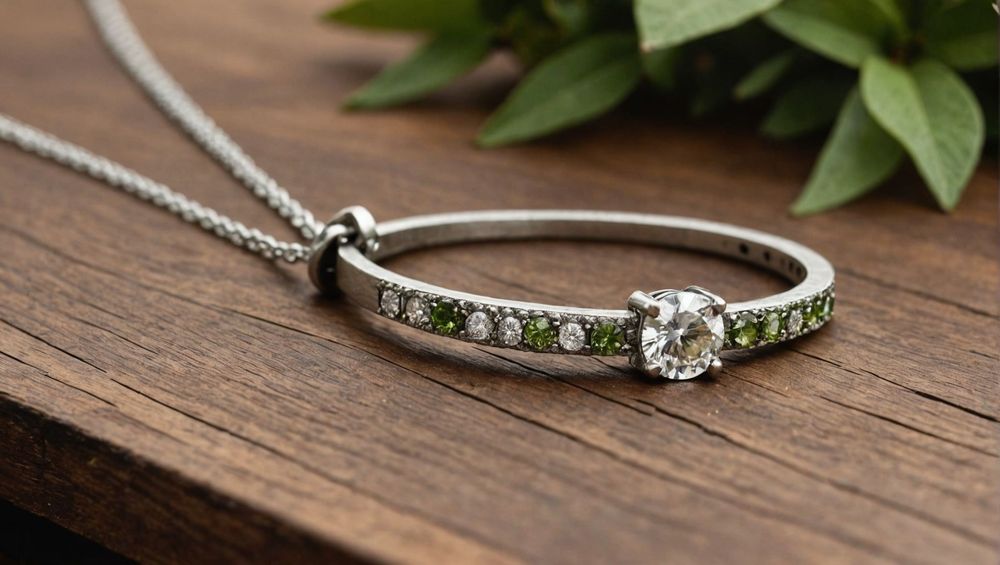Ethical jewelry refers to adornments crafted with a conscious consideration for the social, environmental, and economic impacts associated with their creation. This burgeoning movement emphasizes fair trade practices, responsible sourcing of materials, and sustainable production methods. As consumers increasingly seek products that align with their values, ethical jewelry stands out as a responsible choice, appealing to those who wish to make a positive difference through their shopping habits. In this article, we will explore the various facets of ethical jewelry, its significance, key materials, and how you can choose ethically sourced pieces for your jewelry collection.
The Importance of Ethical Jewelry

The significance of ethical jewelry goes beyond mere aesthetics; it embodies a philosophy that prioritizes human rights and environmental welfare. The traditional jewelry industry has often been associated with exploitative labor practices and environmental degradation, particularly in the mining of precious metals and gems. Ethical jewelry seeks to rectify these issues by ensuring that all components—from the gemstones to the metals—are sourced responsibly. By supporting ethical jewelry, consumers contribute to a more sustainable future, promoting fair labor practices and reducing ecological impact. This transition towards more ethical consumption is not just a trend; it’s a necessary evolution towards greater social responsibility in fashion and beauty.
Key Materials Used in Ethical Jewelry
Many consumers are curious about the sources of materials in ethical jewelry. Here is a list of commonly used ethical materials:
- Recycled Metals: Many jewelers use recycled metals—such as gold, silver, and platinum—to reduce the need for new mining practices.
- Fair Trade Gemstones: These stones are sourced from mines that adhere to fair labor practices and provide safe working conditions for miners.
- Lab-Grown Diamonds: Chemically identical to natural diamonds, lab-grown stones avoid the ethical issues associated with traditional diamond mining.
- Ethical Pearls: Sourced from farms that prioritize environmental sustainability and fair treatment of workers.
- Organic and Sustainable Materials: Elements like wood, bone, and ethically sourced leather are increasingly used in jewelry design.
These materials, coupled with transparent sourcing practices, distinguish ethical jewelry from its conventional counterparts. By opting for jewelry made with these materials, consumers can feel confident that their purchases support not only beauty but also greater ethical standards.
How to Choose Ethical Jewelry

Choosing ethical jewelry involves more than just selecting a pretty piece; it requires an understanding of the practices of the brands you support. Here are some tips to guide your decisions:
- Research Brands: Look for companies that are transparent about their sourcing and manufacturing processes. Authentic brands often share information about their supply chains and ethical commitments.
- Check Certifications: Certifications such as Fair Trade or Responsible Jewelry Council can serve as a guide to the ethical claims made by brands.
- Inquire About Materials: Don’t hesitate to ask jewelers where their metals and stones come from, ensuring their practices align with ethical standards.
- Opt for Vintage or Second-Hand Pieces: Purchasing pre-owned jewelry is a sustainable choice that extends the life cycle of products while reducing waste.
- Consider Handmade Pieces: Artisans often create jewelry with sustainable materials while ensuring fair labor practices, which adds a personal touch to your collection.
By following these guidelines, you can make informed choices that reflect your values and contribute to a more ethical jewelry industry.
Ethical Jewelry and Sustainability
Ethical jewelry is intrinsically linked to the broader concept of sustainability, which emphasizes the need for responsible consumption and environmental stewardship. The jewelry industry has faced scrutiny for its environmental footprint, leading to initiatives aimed at reducing waste and promoting eco-friendly practices. Ethically sourced materials typically involve sustainable mining or production techniques, minimizing adverse effects on the environment. For instance, recycled metals significantly decrease the demand for newly mined resources, while lab-grown gemstones remove the necessity for harmful mining operations. Moreover, many ethical brands focus on reducing packaging and employing eco-friendly shipping practices. Therefore, when you choose ethical jewelry, you are also advocating for sustainable practices that benefit our planet.
Conclusion
Ethical jewelry represents a movement that integrates luxury with social responsibility, allowing consumers to wear their values on their sleeves—quite literally. By supporting ethical practices in the jewelry industry, you not only acquire beautiful pieces but also contribute to fair labor practices and environmental sustainability. The conversation around ethical jewelry is essential, pushing jewelers to become more accountable for their sourcing and production methods. As you look to enhance your collection, remember that your choices matter—choose ethically and make a lasting impact.
FAQs
1. What is the difference between ethical and traditional jewelry?
Ethical jewelry is sourced and produced with consideration for human rights, sustainable practices, and environmental protection, while traditional jewelry may not prioritize these ethical concerns.
2. Are ethical diamonds more expensive than traditional diamonds?
Ethical diamonds, particularly lab-grown ones, can be less expensive than traditional diamonds due to lower production costs. However, prices can vary based on quality and brand.
3. How can I tell if a brand is genuinely ethical?
Look for brands that provide transparent information about their sourcing practices, have ethical certifications, and are willing to answer questions about their supply chain.
4. Can I find ethical jewelry in big retail stores?
While some big retail chains are beginning to offer ethical jewelry lines, it’s essential to research their practices and verify any claims they make regarding ethical sourcing.
5. Is recycled jewelry of lesser quality?
No, recycled jewelry can be of high quality. Recycled metals undergo refining processes to ensure they meet quality standards, making them a sustainable and viable choice.
